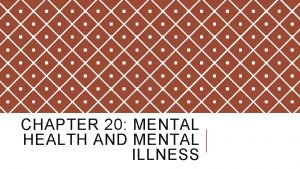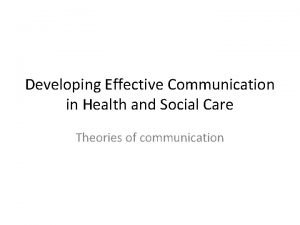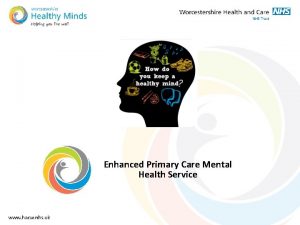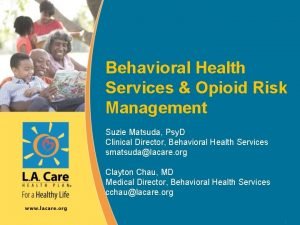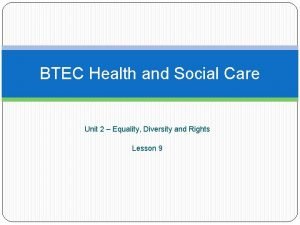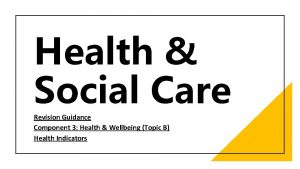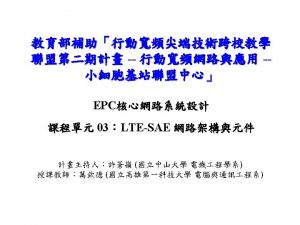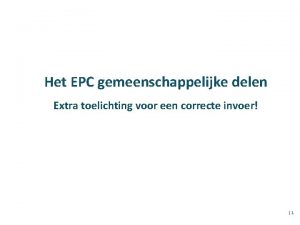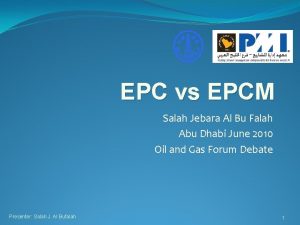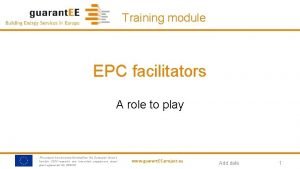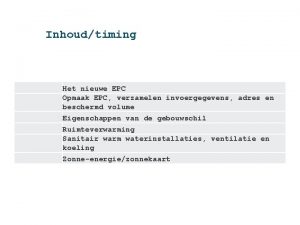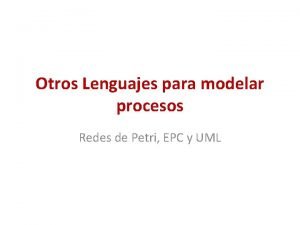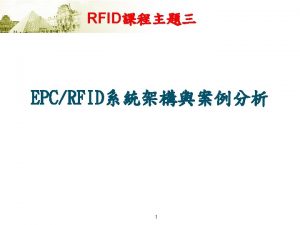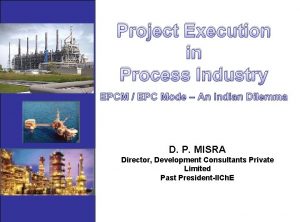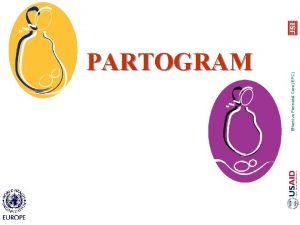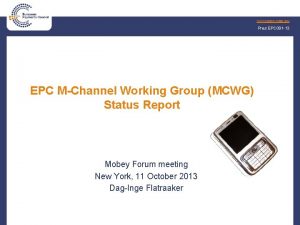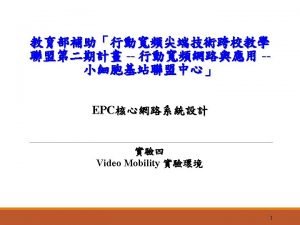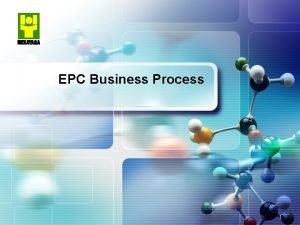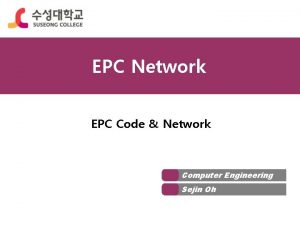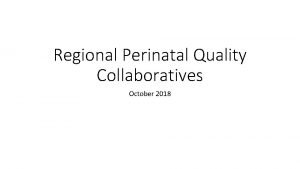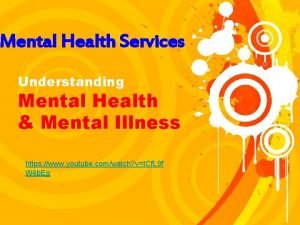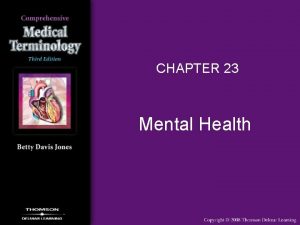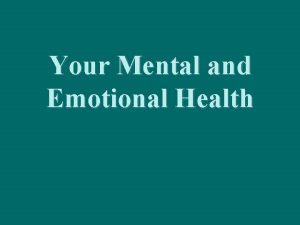Effective Perinatal Care EPC Perinatal mental health 1


























- Slides: 26

Effective Perinatal Care (EPC) Perinatal mental health 1

Case study Effective Perinatal Care (EPC) n You are visiting a mother called Amal is in the first postpartum week; she feels persistently guilty and negative towards herself, cries easily and feels tired and agitated. 1. What might she be suffering from? 2. What other symptoms would you ask her about, to confirm your diagnosis? 2 8 C-2

Stress/anxiety Ø Pregnancy and the puerperium are normal life events, yet they are periods in a woman's life when her vulnerability exposes her to a significant amount of anxiety and stress. Ø Stress during pregnancy is both essential and normal for the psychological adjustment of pregnant women. Ø Conversely, elevated levels of stress hormones and unnecessary anxiety will stretch coping reserves, and could prove crippling. Effective Perinatal Care (EPC) The psychological context of pregnancy and the puerperium 8 C-3

Stress/anxiety Ø there are many factors that contribute to unhappiness in women's lives and affect their emotional health and wellbeing. Ø Understanding the root cause and expression of mental distress in women is complex as the social circumstances into which women live and children are born play a major role in their health and well-being. Effective Perinatal Care (EPC) The psychological context of pregnancy and the puerperium 8 C-4

n Serotonin : – – – Inhibits stress response Regulates sleep Pain sensitivity Sexual functioning Appetite Effective Perinatal Care (EPC) Neurotransmitters n Diminished serotonin – result of stress? 8 C-5

8 C-6 Effective Perinatal Care (EPC)

- Postnatally, parents may find coping with the demands of a new baby, e. g. infant feeding, financial constraints, the whole process of lifestyle adjustments and role changes, a real strain. - For new mothers, this will involve diverse emotional responses ranging from joy and elation to sadness and utter exhaustion. Effective Perinatal Care (EPC) Transition to parenthood 8 C-7

– – – – Difficult labor or unexpected outcome Fatigue, pain and discomfort Disturbed sleep Twins or higher multiples Breastfeeding C-section Change in libido Effective Perinatal Care (EPC) Who is at risk? 8 C-8

– Having a baby, and particularly the transition to parenthood that accompanies the first child, leads to a significant shift in the couple's relationship. Social networks are disrupted, especially those of the Effective Perinatal Care (EPC) Role change/role conflict mother and the quality and quantity of social support such networks can and do provide. 8 C-9

– Effective communication during pregnancy and the puerperium is essential. Yet poor communication is still the single most common factor that is associated with women's dissatisfaction with their care. Ø Being provided with adequate information will serve to: Effective Perinatal Care (EPC) Communication n diminish women's anxiety levels and allay emotional distress n facilitate choice n enable women to maintain control over decision-making. 8 C-10

n Motherhood, it is thought, ensures that a woman has fulfilled her biological destiny, confirms a woman's femininity and raises her status in society, but without financial gain. n Instead of feeling elated by motherhood some women experience displeasure, feelings of unhappiness and feel dismayed or even disappointed in their role as new mothers. n The ideology of motherhood is therefore an assumption and a paradox with inherent dichotomies as the woman strives to be ‘super mum, super wife, super everything’ Effective Perinatal Care (EPC) The ideology of motherhood 8 C-11

Facts about Motherhood n Being a mother will complete me. n Having a child will strengthen our relationship. n Having a child will keep him around. Effective Perinatal Care (EPC) n I will fall in love with my baby immediately. n Mothering is natural. n Breastfeeding is natural, and it will be easy. 8 C-12

n During periods of stress, supportive and holistic care from midwives will not only assist in promoting emotional well-being of women, but will also help to ameliorate threatened psychological morbidity in the postnatal period. n Women who are socially isolated or who have poor socioeconomic circumstances are particularly vulnerable to mental health problems and need additional help and support. Effective Perinatal Care (EPC) Social support 8 C-13

Psychiatric disorders are relatively common after childbirth and may include: postpartum ‘blues’, postpartum depression (PPD), and postpartum psychosis. Effective Perinatal Care (EPC) Definition 8 C-14

n Depression/Anxiety n Obsessive/Compulsive Disorder n Panic Attacks n Post-traumatic Stress n Bipolar n Postpartum Psychosis Effective Perinatal Care (EPC) Spectrum of disorders 8 C-15

n Occurs in about 80% of mothers n Onset 1 st week, lasts up to 3 weeks n Mood instability, weepiness, sadness, anxiety, lack of concentration n Treatment supportive n Not considered part of the spectrum of perinatal mood disorders Effective Perinatal Care (EPC) Postnatal Blues 8 C-16

Incidence: 15 -20% of new mothers Symptoms: n Excessive worry or anxiety n Irritability, short temper n Feeling overwhelmed by responsibilities, difficulty making decisions n Sad mood, feelings of guilt, fear, phobias n Hopelessness n Sleep disturbances (insomnia or hypersomnolence), fatigue Effective Perinatal Care (EPC) Depression and/or Anxiety 8 C-17

Effective Perinatal Care (EPC) n Somatic symptoms without apparent cause n Discomfort around baby n Lack of feelings towards baby n Loss of focus and concentration n Loss of interest and pleasure n Changes in appetite – significant wt gain or loss 8 C-18

Incidence: 3 -5% of new mothers Risk factors: Personal or family hx OCD Symptoms: – Intrusive, repetitive and persistent thoughts or mental pictures – Thoughts often about harming the baby – Tremendous sense of horror and shame – Behaviors to reduce anxiety and protect baby – Counting, checking, cleaning, other repetitive behaviors Effective Perinatal Care (EPC) Obsessive-Compulsive Disorder 8 C-19

Incidence: 10% of postpartum women Risk Factors: n Personal or family hx of anxiety or panic disorder n Thyroid dysfunction Effective Perinatal Care (EPC) Panic Disorder Symptoms: n Episodes of extreme anxiety n chest pain n Sensations of choking, smothering, dizziness 8 C-20

Effective Perinatal Care (EPC) n Hot or cold flashes, trembling, tachycardia, numbness or tingling n Restlessness, agitation, irritability n During attack, may fear she is going crazy, losing her mind n Panic attack may wake her up from sleep n Excessive worry or fear (incl. fear of another panic attack) 8 C-21

Incidence: up to 6% of postpartum women Risk factors: Past traumatic events Symptoms: n Recurrent nightmares n Extreme anxiety n Reliving past traumatic events (sexual, physical, emotional, childbirth) Effective Perinatal Care (EPC) Posttraumatic Stress Disorder 8 C-22

Incidence: no data Risk factors: personal or family hx of bipolar disorder Symptoms: n Mania – racing thoughts, high energy and little sleep, compulsive activity n Depression n Rapid and severe mood swings Effective Perinatal Care (EPC) Bipolar Disorder 8 C-23

Incidence: 0. 1 -0. 2% n Onset usually 2 -3 days postpartum n 5% suicide and 4% infanticide rate Risk factors: n Personal or family hx psychosis, bipolar, schizophrenia n Previous hx postpartum psychosis or bipolar episode Effective Perinatal Care (EPC) Postpartum Psychosis 8 C-24

n Visual or auditory hallucinations n Delusional thinking n Delirium or mania n Very obviously psychotic Effective Perinatal Care (EPC) Symptoms: 8 C-25

n ACOG/APA guidelines (2009) – – Psychotherapy Pharmacotherapy Individualized plan of care Consider continuing medications during pregnancy to avoid risk of relapse (bipolar, psychosis, severe depression) Effective Perinatal Care (EPC) Medical Management 8 C-26
 Mental health and mental illness chapter 20
Mental health and mental illness chapter 20 Mental illness mental health jeopardy
Mental illness mental health jeopardy Argyle’s communication cycle
Argyle’s communication cycle Enhanced primary care mental health
Enhanced primary care mental health Beacon mental health la care
Beacon mental health la care Primary, secondary, tertiary care
Primary, secondary, tertiary care Care value base health and social care
Care value base health and social care Health and social care component 3 health and wellbeing
Health and social care component 3 health and wellbeing Sae epc
Sae epc Epc voorbereiden
Epc voorbereiden Cabuloso
Cabuloso Bu epc
Bu epc Bpmn vs epc
Bpmn vs epc Ilia ditiatev
Ilia ditiatev Epc pre-check
Epc pre-check Slide formazione generale lavoratori
Slide formazione generale lavoratori Epc lib tuke
Epc lib tuke Epc
Epc Epc inspectieprotocol
Epc inspectieprotocol Beschermd volume epc
Beschermd volume epc Geldigheid epc
Geldigheid epc Epc notation
Epc notation Introduction of epc
Introduction of epc Epc business model
Epc business model Feed epc
Feed epc Lstk vs epc
Lstk vs epc Epc
Epc
